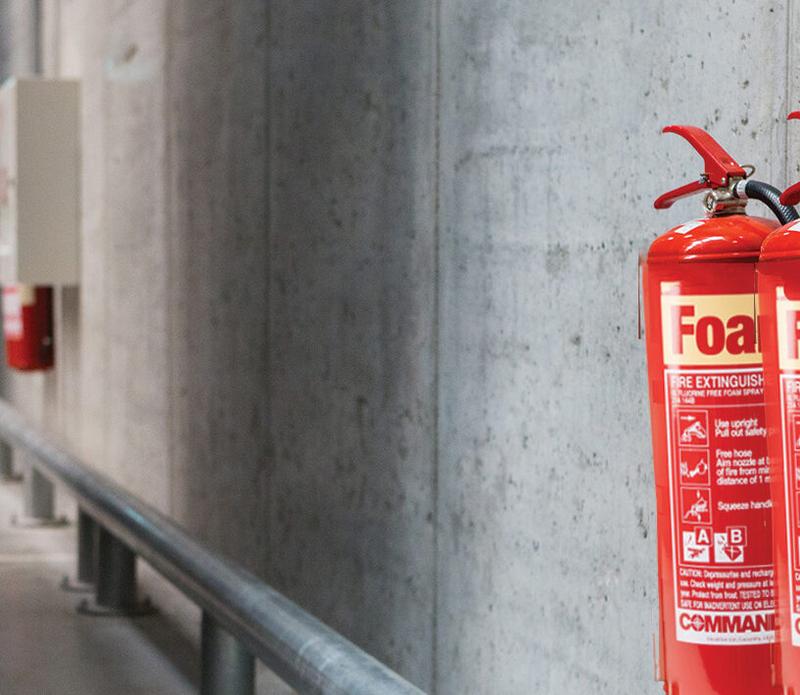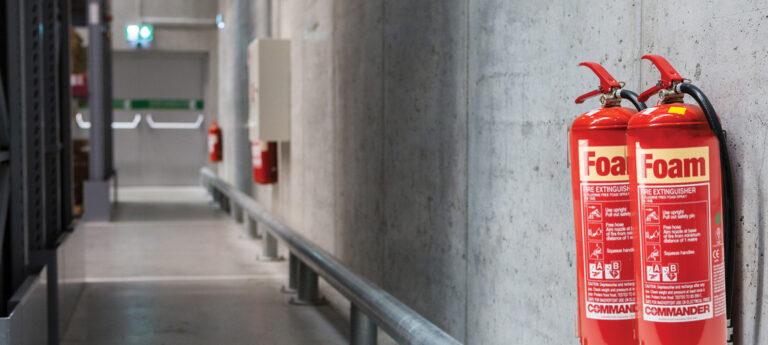What Fire Extinguisher Should I Use?
Grabbing the wrong fire extinguisher can turn a small, manageable fire into a lethal situation. A jet of water aimed at a chip pan fire will send a fireball across the room. Foam sprayed over live electrical equipment can electrocute you. Knowing your fire classes and the extinguisher types that match them is not optional. It is a legal obligation under the Regulatory Reform (Fire Safety) Order 2005.
Fire Classes A Through F: What Actually Burns?
Fires are classified by the material that fuels them. The UK follows the European classification system, which sorts fires into six distinct classes. Each one behaves differently, which means each one needs a different suppression approach. Get the pairing wrong and you make things worse.
Wood, paper, textiles, plastics. The most common fire type in offices, schools, and homes.
Petrol, diesel, oil, solvents, paint. Common in workshops, garages, and industrial units.
Propane, butane, natural gas. The priority is to isolate the gas supply, not fight the flame.
Magnesium, sodium, aluminium swarf. Rare outside specialist manufacturing environments.
Server rooms, switchboards, machinery. Technically not a “class” but needs non-conductive agents.
Deep fat fryers, commercial kitchens. The single most dangerous class to fight with the wrong kit.
Warning: Never use a water extinguisher on a Class F cooking oil fire. The water instantly vaporises beneath the oil surface, causing a violent fireball that can reach ceiling height in under a second. Wet chemical extinguishers are the only safe option for deep fat fryers.
Matching Extinguisher Types to Fire Classes
Five main extinguisher types cover the six classes. The trick is understanding that no single extinguisher works on everything. Dry powder comes closest, but it fills a room with fine particulate, wrecks electronics, and creates zero visibility for evacuation. There is always a trade-off.
| Extinguisher Type | Class A | Class B | Class C | Class D | Electrical | Class F |
|---|---|---|---|---|---|---|
| Water (red label) | Yes | No | No | No | DANGER | DANGER |
| Foam (cream label) | Yes | Yes | No | No | DANGER | No |
| CO2 (black label) | No | Yes | No | No | Yes | No |
| Dry Powder (blue label) | Yes | Yes | Yes | No* | Yes | No |
| Wet Chemical (yellow label) | Yes | No | No | No | No | Yes |
*Class D fires require specialist dry powder formulations. Standard ABC powder extinguishers will not work on burning metals. If your premises involve metal machining or processing, you need a dedicated solution.

The table above shows “DANGER” in two places for a reason. Spraying water at a cooking oil fire or at live electrical equipment does not just fail to put out the fire. It actively creates a new, worse emergency. This is exactly why BS 5306 exists: to ensure the right extinguisher is placed in the right location by someone who actually knows what they are doing.
So What Does That Mean in Practice?
Start with a fire risk assessment. Under the Regulatory Reform (Fire Safety) Order 2005, the “responsible person” for any non-domestic premises must identify fire hazards and put appropriate measures in place. That includes selecting the correct extinguisher types, positioning them on escape routes, mounting them at the right height, and making sure staff know how to use them.
A typical office might need water or foam extinguishers for general combustibles plus a CO2 unit near the server room. A commercial kitchen absolutely must have a wet chemical extinguisher near the fryers. A garage workshop needs foam and CO2 at minimum. The thing is, most premises need more than one type.
Staff training matters just as much as having the right kit on the wall. An extinguisher that nobody knows how to operate is decoration, not protection. Short, practical training sessions once a year keep the knowledge fresh without eating into the working day.

If you are unsure what your premises need, the simplest route is a professional fire risk assessment. We visit, identify the hazards, recommend the right combination of extinguisher types, install them in compliant positions, and train your team. One visit, everything sorted.
Need Help Choosing the Right Extinguishers?
We supply, install, and commission fire extinguishers across Cumbria and the Lake District. Give us a ring or drop us an email.